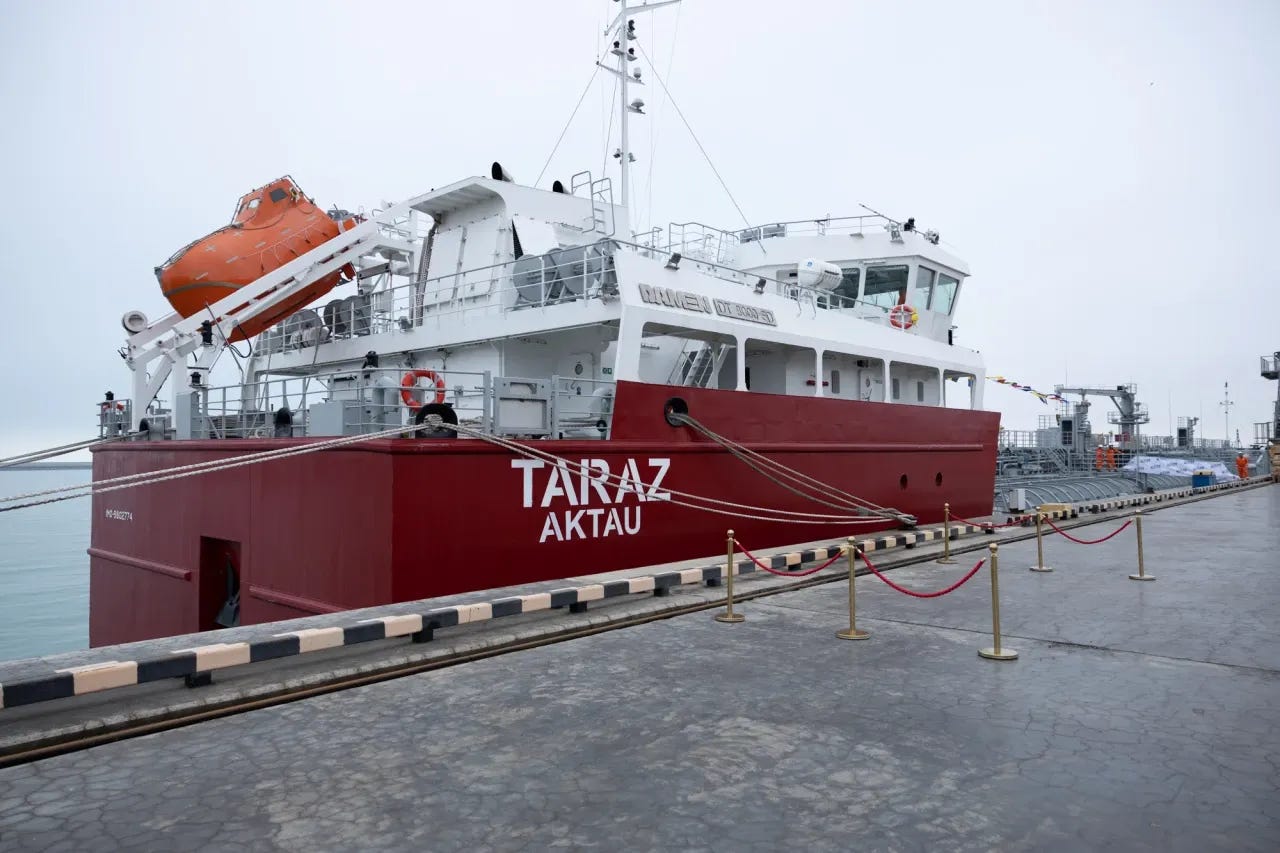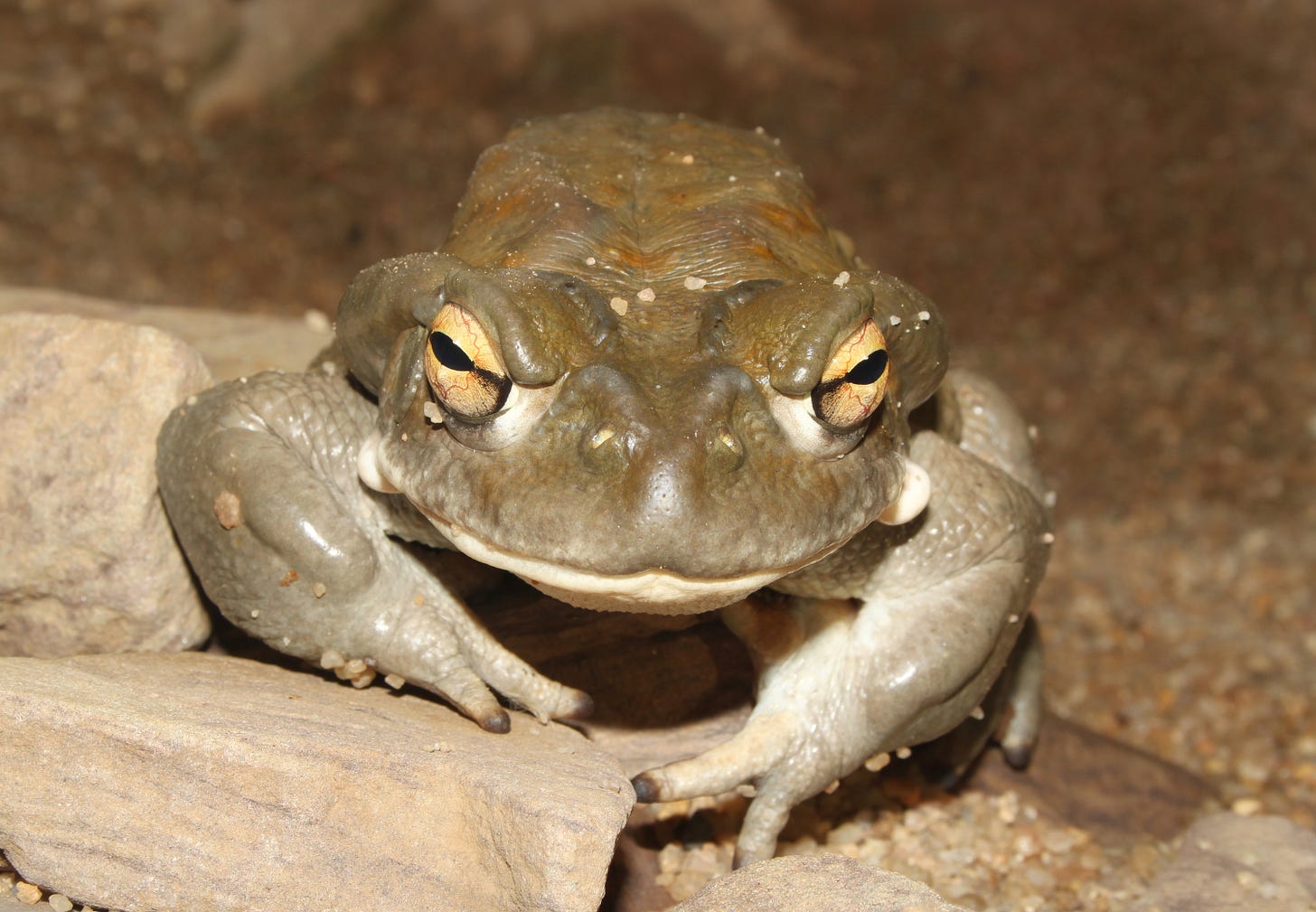Central Asia's week that was #39
Kazakh crime boss gets Bloody January sentence, VAT hike planned, Kyrgyz industry chief arrested. Also, crypto in Uzbekistan, illegal migration ring busted, and trip-inducing toads.
So this happened…
A court in Kazakhstan sentenced Arman Dzhumageldiyev, an organised crime boss popularly known by his nickname Wild Arman, to 20 years in prison for his part in instigating the deadly unrest of January 2022. Almaty’s Specialised Criminal Court convicted Dzhumageldiyev on five charges, including leading an organised crime group and inciting riots. The group led by Dzhumageldiyev was accused of kidnapping dozens of people – one of whom reportedly died – and looting weapons from police depots. The same trial saw former National Security Committee officer Ruslan Iskakov receive 15.5 years for his role in the events. In early 2023, Iskakov addressed an open letter to Novaya Gazeta Europe, claiming that Samat Abish, a nephew of former president Nursultan Nazarbayev, was responsible for directing the disturbances. Abish was given an eight-year suspended sentence in March 2024.
Kazakhstan’s government is poised to implement a major tax reform that could see a significant increase in the value-added tax rate. While officials have not confirmed specific figures, discussions in government circles indicate the VAT rate could rise from 12 percent to as high as 20 percent. Prime Minister Olzhas Bektenov said at a Cabinet meeting that the aim is to shift the tax burden away from wages to consumption by lowering payroll-related taxes. Officials argue this would boost competitiveness, increase wages, and create financial reserves for businesses. Government representatives insist VAT adjustments are still under discussion. This bruited policy decision signals a sharp change of tack. In March, President Kassym-Jomart Tokayev argued against increasing VAT to 16 percent, which he warned could increase inflation and favour growth of the shadow economy.
Kyrgyzstan’s security services arrested the former president of Kyrgyzindustriya, a state-run agency tasked with revitalising dormant industries and attracting foreign investment, on corruption charges. Investigators allege that over 2.3 billion soms (around $26 million) in funds allocated to the agency between 2022 and 2024 was misused through a scheme involving more than 40 loss-making subsidiaries. They claim the agency’s leadership set up the entities from the outset as a way to siphon off public funds. Critics of Kyrgyzindustriya warned at the time of its creation, in 2022, that the nebulousness of the entity, which was structured to operate like a private enterprise, could give rise to corrupt practices.
Kazakhstan has begun shipping oil from the giant Kashagan field via the Baku-Tbilisi-Ceyhan pipeline, a route that bypasses Russia. The first batch was carried aboard the Kazakh-registered tanker Taraz from Aktau to Baku and will be transported onward to the Mediterranean through BTC. The shipment was organized by KMG Kashagan, a subsidiary of state-run KazMunaiGas, as part of President Kassym-Jomart Tokayev’s directive to develop alternative export routes. Last March, KazMunaiGas and Azerbaijan’s SOCAR signed an agreement to gradually increase Kazakh oil shipments via BTC to 2.2 million tons annually – up from an earlier target of 1.5 million tons. The broader aspiration is for Kazakhstan to increase its deliveries of oil through Azerbaijan to 5-7 million tons annually, which would require also using the Baku-Supsa pipeline to the Black Sea.
Supermarkets in Kazakhstan’s capital, Astana, reportedly introduced a purchasing limit on potatoes, restricting customers to five kilograms per person. Retail chains Small and Spar said the measure was designed to prevent bulk-buying by resellers who inflate prices in smaller neighbourhood shops. Government officials have sought to reassure the public that such developments are not the result of a national shortage of potatoes. But prices have nevertheless been surging. This week, the government imposed a six-month export ban on potatoes to countries outside the Eurasian Union, a Russia-led trading bloc, in an attempt to stabilise prices. One farming expert told Orda, a news outlet, that the potato price crisis was attributable to widespread data falsification by officials inflating crop yield reports.
Kazakhstan may develop up to three nuclear power plants in parallel to meet growing electricity demand, Energy Minister Almasadam Satkaliyev said. He argued that last year’s referendum, which was framed as a vote on a single nuclear plant, signalled broad public support for nuclear energy as a whole, making additional plebiscites unnecessary. There is some uncertainty over timelines. Satkaliyev suggested that building the first plant will likely take around a decade. President Kassym-Jomart Tokayev said in an interview earlier this year that a decision on which companies will form the consortium responsible for construction will be made in 2025.
Survey request: Last chance
Again, many thanks to everyone who has already generously given up time to fill out this reader survey. If just a handful more readers are prepared to spare a few minutes doing the same, I will stop asking! It really is immensely useful for me as I take this project forward.
Click here.
And there’s this too…
Uzbekistan has given the green light to Binance, one of the world’s largest cryptocurrency exchanges, to legally offer its services in the country. Binance will operate in Uzbekistan in partnership with Coinpay, an exchange that has already obtained a local crypto exchange license. The exchange will integrate local payment systems, enabling users to deposit and withdraw funds in Uzbek sums. Uzbekistan has generally been well-disposed to the cryptocurrency economy. The foundation for the country’s regulated crypto industry was laid by a 2018 presidential decree. Those regulations required foreign cryptocurrency exchanges to register a local entity and host their trading systems on Uzbek servers. It is unclear if Binance’s integration with Coinpay entails compliance with the latter provision.
Law enforcement authorities in Kyrgyzstan arrested three Pakistani nationals on suspicion of running an illegal migration scheme. Investigators say the suspects used counterfeit Kyrgyz passports to smuggle other Pakistani citizens into the country, charging $2,000 per document. The group allegedly forced the new arrivals into labour and then confiscated their earnings. In recent years, Pakistani nationals have become a more visible presence in Kyrgyzstan. Many have arrived as students, most commonly to pursue courses at medical schools. Growing numbers are also finding work in the textiles and food delivery industries. But mounting inward migration has become a contentious issue and has prompted authorities to pledge crackdowns against violations of migration rules.
Uzbekistan Airways, the state-owned carrier, has rerouted all flights to Europe to avoid Russian and Belarusian airspace, instead flying south via Azerbaijan and Turkey. The airline said the change, which took effect earlier this month, was a precautionary measure, but it did not elaborate. The likely trigger for the route change was the recent downing of an Azerbaijan Airlines plane by Russian military air defense systems, which led to the death of 38 people. After the plane was struck, pilots of the Azerbaijan Airlines flight sought to divert but crashed in a location near Aktau airport, in Kazakhstan.
Lawmakers in Kyrgyzstan are considering a bill that would ban the import of certain types of toads due to their potential use in the production of narcotics. In making the case for the prohibition at a session of parliament, Deputy Health Minister Kaarmanbek Baidavletov explained that some amphibians secrete venom containing psychoactive substances capable of triggering powerful hallucinogenic effects. This measure is part of broader efforts to combat the illegal narcotics trade, which appears to be thriving in Kyrgyzstan. Earlier this month, the Interior Ministry revealed that law enforcement agencies had intercepted more than 15 tons of drugs, psychotropic substances, and precursors during sweeps conducted in 2024.
The government of Uzbekistan has created a roadmap for developing a “nighttime economy,” which officials hope will spur job creation and tourism. A concept outline shared by authorities proposes 24/7 dining districts, night markets, and cultural events, along with expanded nighttime public transport and improved lighting and parking. No city is named in the concept document, but the initiative is most likely to be piloted in major urban centres, such as Tashkent. If successful, the undertaking would represent a major cultural shift. Visitors to Uzbekistan – and even residents – have long grumbled that even the country’s largest cities fail to cater to night owls.
A man in Uzbekistan has been sentenced to one year of corrective labour for leaving a rude remark on the Instagram account of a well-known television presenter. The 38-year-old was already serving a prison sentence for fraud when he was slapped with this charge. Speaking to the court via videoconference, the man reportedly admitted to posting the comment, claiming he acted out of frustration over what he saw as inappropriate behaviour in a video showing Nilufar Sotiboldiyeva dancing with her daughter during a trip to Thailand. He apologized, but Sotiboldiyeva rejected his appeal for reconciliation. She instead demanded nearly $8,000 in damages.








